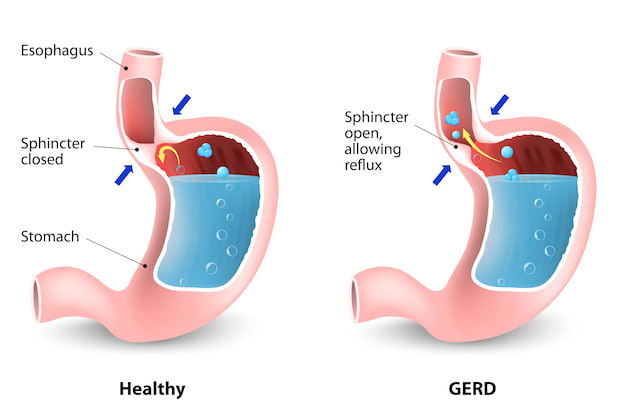Table of Contents
What is GERD?
GERD (gastroesophageal reflux disease) is a chronic gastrointestinal disorder that affects millions of Americans. According to the National Institute of Diabetes and Digestive Diseases, around 20 percent of the United States population has GERD. Everyone experiences indigestion from time to time, but those with GERD are in a continuous battle with their digestive system. [1]
It can be challenging to determine how many people are living with GERD because many people with this disorder do not consult a healthcare provider. GERD occurs when stomach acid frequently flows back into the tube, connecting your mouth and stomach. This backwash irritates the lining of your esophagus. You may have GERD if you experience mild acid reflux at least twice a week. GERD can often be maintained with medications like Prilosec or Nexium, but some people may need to make lifestyle changes to ease the symptoms. Read on to learn more about GERD and the treatments available. [2]

a. Why does GERD Occur?
The process of swallowing food is more complicated than you may think. Malfunctions in this system can cause discomfort in those who experience frequent acid reflux. When you consume foods or liquids, a circular band of muscle at the bottom of your esophagus (lower esophageal sphincter) relaxes to allow that food or liquid to enter the stomach.
In GERD patients, this sphincter becomes weak, and the stomach acid flows back into the esophagus. This acid irritates the lining of the esophagus and leads to inflammation. [2]
Symptoms of GERD
GERD can occur at any time, and some people only experience symptoms at night. Some common signs of GERD can include:
- Difficulty swallowing
- Chest pain
- A burning sensation in your chest (heartburn), usually after eating
- The sensation of a lump in your throat
- Regurgitation of food or sour liquid
Nighttime acid reflux symptoms may be more severe and can include:
- Disrupted sleep
- Laryngitis
- Chronic cough
- New or worsening asthma [3]
Risk Factors for GERD
Several factors can increase your risk of developing GERD. You are at a higher risk for GERD if you are overweight or pregnant. It is common to experience heartburn during pregnancy because hormones cause the digestive system to slow down. The growing uterus also pushes up on the stomach, which can sometimes force stomach acid up into the esophagus. [4]
Overweight individuals have an increased risk of GERD due to excess belly fat causing pressure on the stomach. This can also lead to a hiatal hernia, which occurs when the stomach bulges up into your chest through an opening in your diaphragm (muscles that separate the two areas). Researchers have found that the connection between obesity and GERD seems stronger in the Caucasian population, especially women. [5]
If you have a connective tissue disorder, you are also at risk for developing GERD. Scleroderma is a connective tissue disorder, which causes the body to produce too much collagen. Collagen is the primary protein found in connective tissue, and scleroderma involves the deposit of collagen in organs, including the muscles of the esophagus. This can lead to stomach acid escaping up into the esophagus and causing GERD. [6]

Certain foods and habit can irritate GERD, including:
- Eating large meals
- Smoking
- Eating fatty or fried foods
- Drinking coffee
- Drinking tea
- Drinking alcohol
- The use of nonsteroidal anti-inflammatory drugs (NSAIDS) like aspirin
- Eating close to bedtime [7]
Diagnosis
If you think that you are experiencing heartburn more than usual, then your doctor may refer you to a gastroenterologist. Before you go into your appointment, make a list of the medications you take, any foods that trigger your heartburn, and the symptoms you experience. Your doctor will likely perform the following tests to determine the cause of your acid reflux issue:
Ambulatory acid probe test: This test measures how much acid is in your stomach over 24 hours. This test is performed by inserting a long, thin, flexible tube in the nose and down your esophagus. You will then wear a small device to track how much acid comes into your esophagus or throat from your stomach.
Endoscopy: This test involves inserting a thin tube and a tiny camera into your digestive tract to look for damage. The camera is threaded through your nose and into the esophagus. The camera can detect any abnormalities in your esophagus.

Manometry (esophageal motility testing): This test also involves a tube inserted into the esophagus to measure how your esophagus moves and how it pushes acid upward.
X-rays: Before an X-ray is taken, you will swallow a chalky liquid called barium. The barium will coat the inside of your throat, stomach, and upper intestines. This will allow the doctors to see if there are any problems with your organs on the X-ray. [8]
Treatments
The goal of GERD treatment is to limit the discomfort caused by acid reflux. There are several things you can do at home to prevent GERD symptoms. Some lifestyle changes you can make include:
- Lose weight
- Wear loose-fitting clothing
- Sleep on an angle
- Quit smoking
- Stay upright for 3 hours after meals
Antacids are often recommended to relieve heartburn and other mild GERD symptoms. There are many over-the-counter medications available to treat these mild symptoms. If your GERD is more severe, your doctor may recommend Prilosec, Nexium, and Aciphex. Drugs like Prilosec are proton pump inhibitors that decrease the amount of acid produced in the stomach. Your doctor will determine which medication is right for you. [9]
The content in this article is intended for informational purposes only. This website does not provide medical advice. In all circumstances, you should always seek the advice of your physician and/or other qualified health professionals(s) for drug, medical condition, or treatment advice. The content provided on this website is not a substitute for professional medical advice, diagnosis or treatment.
